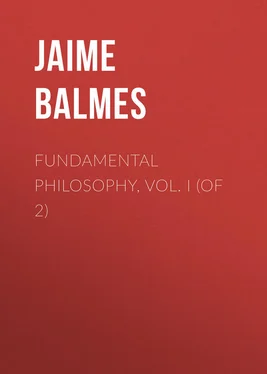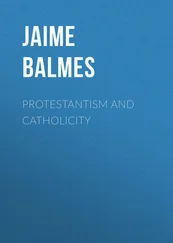Jaime Balmes - Fundamental Philosophy, Vol. I (of 2)
Здесь есть возможность читать онлайн «Jaime Balmes - Fundamental Philosophy, Vol. I (of 2)» — ознакомительный отрывок электронной книги совершенно бесплатно, а после прочтения отрывка купить полную версию. В некоторых случаях можно слушать аудио, скачать через торрент в формате fb2 и присутствует краткое содержание. Жанр: foreign_antique, foreign_prose, на английском языке. Описание произведения, (предисловие) а так же отзывы посетителей доступны на портале библиотеки ЛибКат.
- Название:Fundamental Philosophy, Vol. I (of 2)
- Автор:
- Жанр:
- Год:неизвестен
- ISBN:нет данных
- Рейтинг книги:3 / 5. Голосов: 1
-
Избранное:Добавить в избранное
- Отзывы:
-
Ваша оценка:
- 60
- 1
- 2
- 3
- 4
- 5
Fundamental Philosophy, Vol. I (of 2): краткое содержание, описание и аннотация
Предлагаем к чтению аннотацию, описание, краткое содержание или предисловие (зависит от того, что написал сам автор книги «Fundamental Philosophy, Vol. I (of 2)»). Если вы не нашли необходимую информацию о книге — напишите в комментариях, мы постараемся отыскать её.
Fundamental Philosophy, Vol. I (of 2) — читать онлайн ознакомительный отрывок
Ниже представлен текст книги, разбитый по страницам. Система сохранения места последней прочитанной страницы, позволяет с удобством читать онлайн бесплатно книгу «Fundamental Philosophy, Vol. I (of 2)», без необходимости каждый раз заново искать на чём Вы остановились. Поставьте закладку, и сможете в любой момент перейти на страницу, на которой закончили чтение.
Интервал:
Закладка:
158. We make sensations objective only by virtue of an irresistible instinct. Nothing is more certain, more evident to the eyes of philosophy, than the subjectivity of all sensations; that is, sensations are immanent phenomena, are within us, and do not go out of us; and yet nothing is more constant than the transition made by the whole human race from the subjective to the objective, from the internal to the external, from the phenomenon to the reality. On what is this transition grounded? If the most eminent philosophers experienced so much difficulty in finding the bridge, which unites the two opposite banks; if some of them, wearied with investigation, resolutely asserted that it was not possible to discover it, will the commonalty of mankind discover it from their very childhood? Evidently, motives of reasoning do not explain the transition; appeal must be made to the instinct of nature. There is then an instinct, which by itself assures us of a truth demonstrated with difficulty by the most abstruse philosophy.
159. Here I shall notice the errors of those methods which isolate man's faculties, and, in order better to know the mind, disfigure and mutilate it. One of the most constant and fundamental facts of ideological and psychological science, is the multiplicity of acts and faculties of the soul, notwithstanding its simplicity attested by the unity of consciousness. There is in man, and in the universe, an assemblage of laws, the effects of which are simultaneously evolved with harmonious regularity; to separate them, is often equivalent to placing them in contradiction; for, no one of them being capable of producing its effect if isolated, but requiring to be combined with the others, they produce, when made to operate alone, instead of their regular effects, the most hideous monstrosities. If you retain in the world only the law of gravitation not combined with that of projection, every thing will be precipitated towards one centre; instead of that infinity of systems which adorn the firmament, you will have only a rude and indigested mass. If you destroy gravitation, and preserve the force of projection, all bodies will be decomposed into imperceptible atoms, and be dispersed, like most subtle ether, through regions of immensity. (15) Конец ознакомительного фрагмента. Текст предоставлен ООО «ЛитРес». Прочитайте эту книгу целиком, купив полную легальную версию на ЛитРес. Безопасно оплатить книгу можно банковской картой Visa, MasterCard, Maestro, со счета мобильного телефона, с платежного терминала, в салоне МТС или Связной, через PayPal, WebMoney, Яндекс.Деньги, QIWI Кошелек, бонусными картами или другим удобным Вам способом.
CHAPTER XVI.
CONFUSION OF IDEAS IN DISPUTES ON THE FUNDAMENTAL PRINCIPLE
160. There are, in our opinion, various principles, which, with regard to the human intellect, may be called equally fundamental, both because they serve as foundation in the common and scientific orders, and because they do not rest upon any other, since it is impossible to assign any one which enjoys this quality as an exclusive privilege. In seeking the fundamental principle, it is customary in the schools to observe that they do not endeavor to find a truth from which all others emanate, but an axiom the destruction of which draws with it that of all other truths, and the firmness of which sustains them, at least indirectly, in such manner that whoever denies them may be refuted by indirect demonstration, or reduction ad absurdum ; that is, admitting the above axiom, it may follow that whoever denies the others will be convicted of being in opposition to one which he himself has acknowledged to be true.
161. It has been much disputed whether this or that principle merit the preference. We believe that there is here a confusion of ideas, proceeding in great part from not sufficiently marking the limits of testimonies so distinct as those of consciousness, of evidence, and of common sense.
Descartes' famous principle, I think, therefore I am ; that of contradiction, it is impossible for a thing to be and not to be at the same time ; and what is called the principle of the Cartesians, whatever is contained in the clear and distinct idea of anything, may be affirmed of it with all certainty ; are the three principles that have divided the schools. In favor of each, reasons the most powerful, and even conclusive against the others, considering the ground on which the question was placed, have been brought forward.
If you are not certain that you think, argues the partisan of Descartes, you cannot be certain even of the principle of contradiction, or know the criterion of evidence to be valid; for both, it is necessary to think; whoever affirms or denies anything, thinks; without thought, neither affirmation nor negation is possible. But let us admit thought: we have already a foundation, and one of such a nature that we find it in ourselves, attested by consciousness, irresistibly forcing upon us the certainty of its existence. The foundation once laid, we see how the edifice can be raised; for this we need not go out of our own thought; there is the luminous point to conduct us in the path to truth; let us follow its splendor, and having established an immovable point, let us draw from it the mysterious thread to guide us in the labyrinth of science. Thus our principle is the first, the basis of all others; it has sufficient power to sustain itself, sufficient also to impart firmness to others.
This language is certainly reasonable; but it has this fault, that the conviction which it is intended to produce, is neutralized by the not less reasonable language of those who hold a directly contrary opinion. One who maintains the principle of contradiction may reason thus: if you do not admit it to be impossible for the same thing to be and not be at the same time, it may be possible that you think and do not think at the same time; your assertion, then, I think , is of no weight, for its opposite, I do not think , may, at the same time, be true. In this case, the conclusion of existence is invalid; for, even admitting the legitimacy of the consequence, I think, therefore I am , as we know on the other hand that this other premise, I do not think , is possible, the deduction cannot be made. Nor is the other principle: whatever is contained in the clear and distinct idea of anything, may he affirmed of it with all certainty , of any more value without the principle of contradiction; because if being and not-being are possible at the same time, an idea may be clear and obscure, distinct and confused; a predicate may be contained and not contained in the subject; we may be certain and uncertain, affirm and deny; therefore it is of no service.
He who argues thus seems quite reasonable; but strangely enough, the advocate of the third principle brings equally strong arguments against his two adversaries. How is it known, he asks, that the principle of contradiction is true? Only because we see in the idea of being the impossibility of its being and not being at the same time, and vice versa ; therefore, we are sure of the principle of contradiction only from the application of the principle: whatever is contained in the clear and distinct idea of anything, may he affirmed of it with all certainty . If nothing can be sustained without relying upon the principle of contradiction, – and this is based upon our principle, – ours is the foundation of them all.
Читать дальшеИнтервал:
Закладка:
Похожие книги на «Fundamental Philosophy, Vol. I (of 2)»
Представляем Вашему вниманию похожие книги на «Fundamental Philosophy, Vol. I (of 2)» списком для выбора. Мы отобрали схожую по названию и смыслу литературу в надежде предоставить читателям больше вариантов отыскать новые, интересные, ещё непрочитанные произведения.
Обсуждение, отзывы о книге «Fundamental Philosophy, Vol. I (of 2)» и просто собственные мнения читателей. Оставьте ваши комментарии, напишите, что Вы думаете о произведении, его смысле или главных героях. Укажите что конкретно понравилось, а что нет, и почему Вы так считаете.












